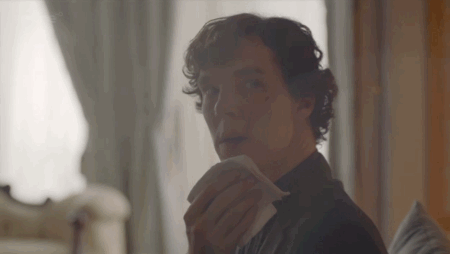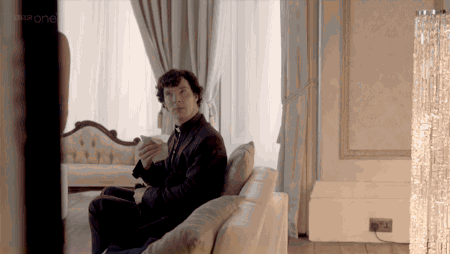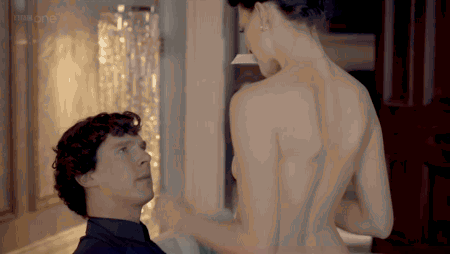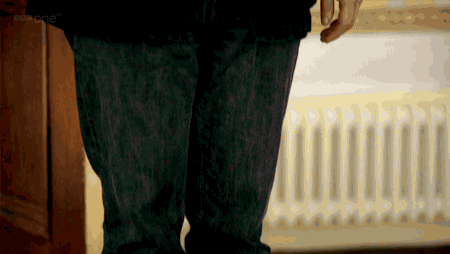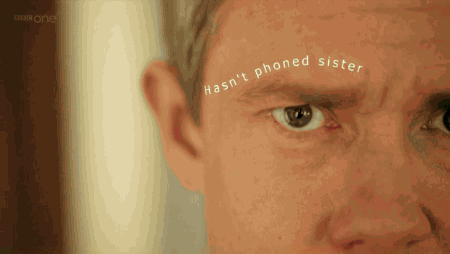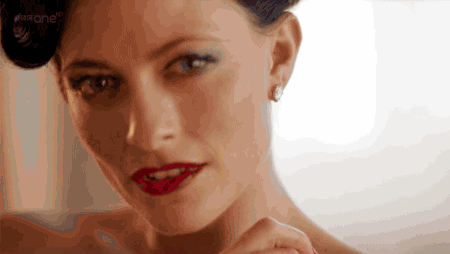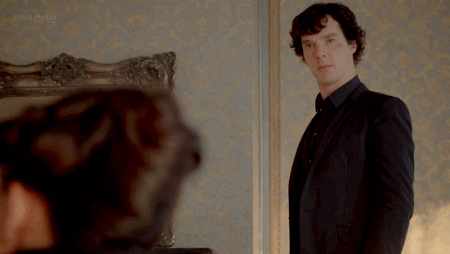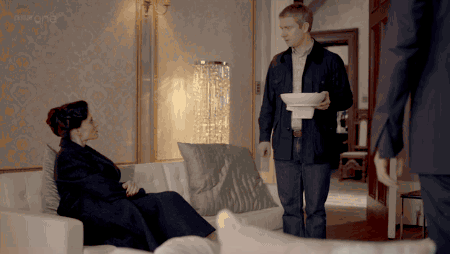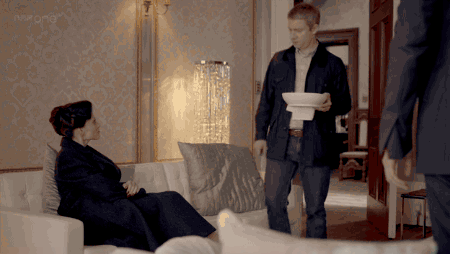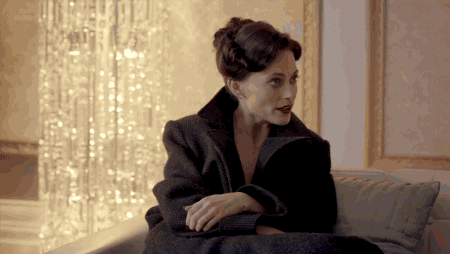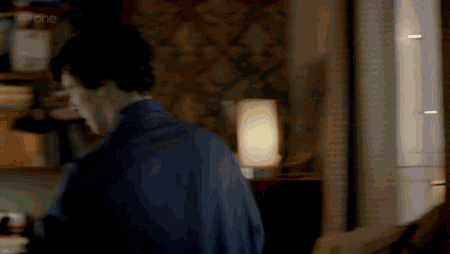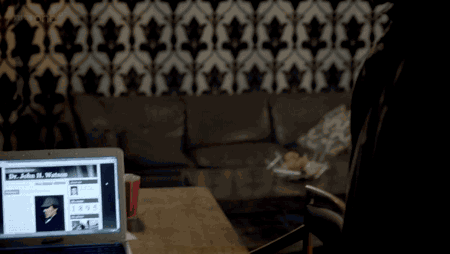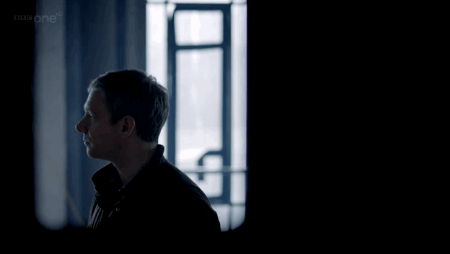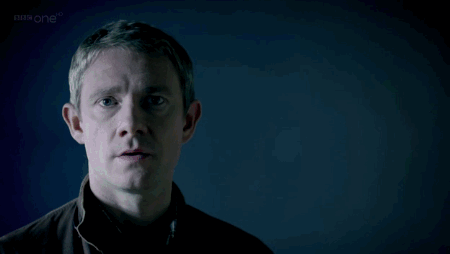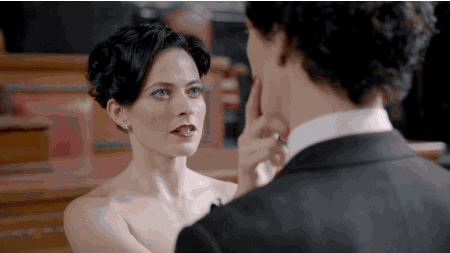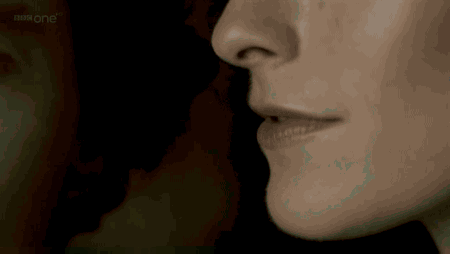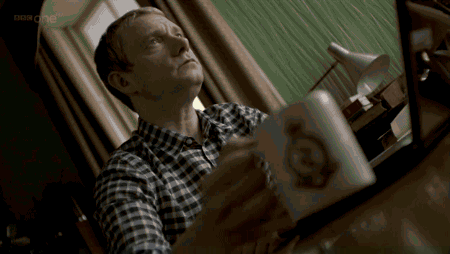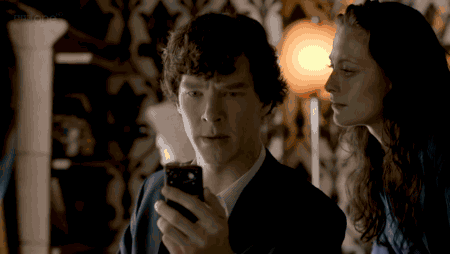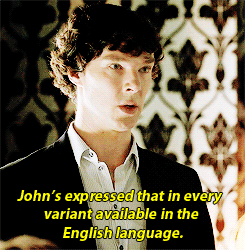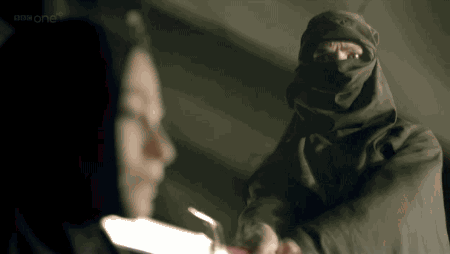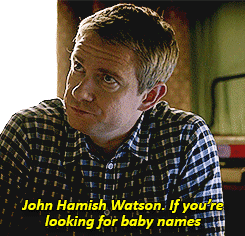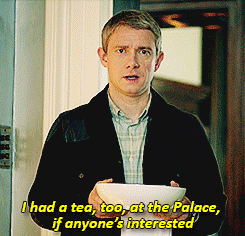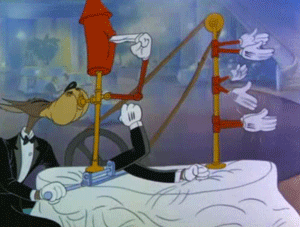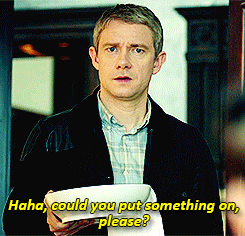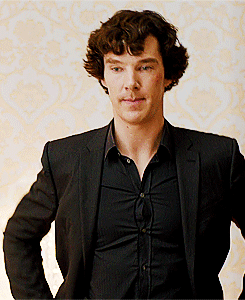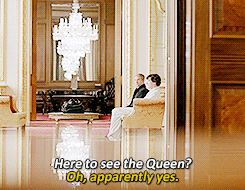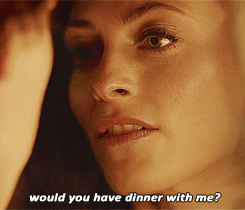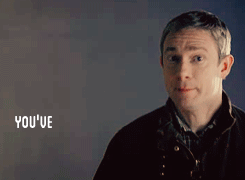
BBC Sherlock Fan Forum - Serving Sherlockians since February 2012.
- ukaunz
- High Functioning Sociopath
 Offline
Offline 
- From: Australia
- Registered: February 13, 2015
- Posts: 2,584
Why I'm now convinced Sherlock didn't fall for Irene
A lot of people think Sherlock falls in love with Irene, evidenced either by his reaction when they meet (i.e. he's attracted to her physically or intellectually), or by his grief when he thinks she's dead, or later on when they seem to flirt with each other. I was once one of the people who thought that he was romantically attracted to her. Watching again, I am now convinced that he was not, even though she falls for him. This is really long, sorry. I ended up analysing the episode scene by scene. I know it's all been meta'd before, but maybe I will manage to come up with something new ![]()
I'm skipping over the pool scene and the random clients, to the bit at Buckingham Palace where Sherlock looks at photos from Irene's website. At this point she's just a beautiful face and a challenge. Mycroft practically eggs Sherlock into taking the case with his comments about Sherlock being alarmed by sex, so Sherlock is determined to prove that he isn't. He's not really interested in the case until that point. Actually he looks a whole lot more interested when he learns that the royal in the compromising photos is another female. Does he not like the idea of someone being blackmailed for being gay?
So, starting with the naked woman scene. He's definitely startled, and can't remember his alias, but he has no difficulty avoiding looking at her body, and looks at her face the whole time they are talking. It's true that he blinks his eyes as John comes into the room with the bowl of water, but I've watched it in slow-mo, and he still doesn't sneak any glances at her breasts or anywhere else. Nope, not interested. He allows himself to run his gaze over her body looking for clues, but as there is nothing obvious (tattoos, scars etc.) he focusses on her face. He doesn't seem uncomfortable by her nakedness, or aroused, but she's playing him with the information that Moriarty gave her, that's why she makes the comment that Sherlock doesn't appear to know where to look. When she tells John she likes detective stories and detectives, Sherlock is looking at John's face and sees the little smile there. He suddenly blurts out his words (look at me, John, not her!). I think Irene's expression shows that she has realised there's another way to play Sherlock Holmes; he likes to show off his powers of deduction (particularly in front of John). Remember she mentions later how the MOD official liked to show off?
Getting back to the business of finding the photographs, Sherlock starts to talk to Irene about the dead hiker, to pass the time while John sets off the fire alarm. He's pacing the room, not really looking at her. He calls her moderately clever, but in fact he's pretty scornful of her to begin with. "...You cater to the whims of the pathetic and take your clothes off to make an impression. Stop boring me and think. It's the new sexy." (That last bit spoken with a sneer. Does he find her sexy? I doubt it).
After Sherlock deduces the safe key-code and the Americans are put out of action, Irene says she's flattered that he worked it out (using her measurements) but her tells her not to be. He's observant, but still not interested in her. Only in the phone. He's continually looking at it, until she distracts him with a stroke on his arm and then jabs him with the needle. I like how she checks with Sherlock before telling John that the safe code was her measurements, like she's teasing Sherlock. Does Sherlock want John thinking that he was looking at her body that closely? Probably not. She's already worked out where Sherlock prefers to look.
I've already posted another thread about the next scene where Irene solves the mystery of the dead hiker while Sherlock was hallucinating from the drug. I don't think there are any clues relevant to this thread here, he's so out of it anyway. Except that the first two words Sherlock utters when he wakes up are both "John", that's interesting isn't it? Then he asks "where is she?". Who? "The woman, that woman... The woman! The woman woman!" He can't even remember her name. She said she returned his coat, so where is it? He's not looking for her under his bed obviously.
The morning after, we are shown that he is receiving texts from Irene but he reads them without reaction and never replies. He doesn't bother to delete them or change the text alert noise either. I think he is still smarting from being beaten (not just with a riding crop) and possibly thinks there is still a chance to retrieve the phone. He overhears Mycroft talking about Bond Air, and wonders if there was more in Irene's phone than just the royal scandal photos; he asks Mycroft if "something big is coming". Mycroft tells him to stay out of it, so Sherlock is obviously going to be very interested in finding out what it is. He's probably going to be thinking about it constantly until he solves it.
Some time later at the Christmas drinks party he's acting sarcastic and rude, but only a little more than usual. Although what he says to Molly is perhaps uncharacteristically cruel, all the deductions about the guests are said in a joking way with a smile, like he thinks he's being charmingly clever. He really doesn't know how to behave at social gatherings. I don't think he even realises the comment about her mouth and breasts is a cruel thing to say. It's when he opens the card and realises that the gift is meant for him that he suddenly feels he has gone too far, and apologises. Then he gets Irene's text message and finds the phone on the mantel. He's received 57 texts from her by this stage but still hasn't replied to any. Like Molly's, Irene's present is wrapped in the same shade as her lipstick when they met, either an unconscious association or one that she's deliberately trying to encourage. To Sherlock, that means she has love on her mind. I wonder if he knows what's in the box before he opens it? He goes to his room for privacy, but he opens the gift in a very business-like way, not as though he's anticipating something special from a loved one. He seems a little surprised to see the phone inside, and takes a moment to study it. That's when he realises the significance and calls Mycroft. His expression is fairly unreadable (to me) as he closes the door on John, but it could just be thoughtful.
At the morgue, he shows no flicker of emotion as he looks at the body, and walks off fairly quickly after identifying it as Irene. He is standing in the corridor, staring out a window, when Mycroft comes out and offers him a cigarette; out of sympathy? Sherlock doesn't seem to know why Mycroft is offering it to him, but he doesn't pass it up. He notices the crying relatives and wonders aloud if there is something wrong with the two of them because they don't care like other people. Doesn't this indicate that he is not feeling anything for Irene even though she has been killed, and is wondering if that's normal? Mycroft replies with the words "All lives end, all hearts are broken. Caring is not an advantage... (pause) ...Sherlock". It's like he thinks Sherlock needs reminding, that he believes Sherlock is upset about Irene. Sherlock complains about the low tar cigarette, and Mycroft says "Well, you barely knew her", again reminding Sherlock that he shouldn't be letting his emotions get the better of him. Sherlock says "huh" with an amused smile, like he's thinking Mycroft has misread him, and walks off. "Merry Christmas, Mycroft." It's like he's saying "you're wrong about me Mycroft", but he can't even be bothered correcting him. Mycroft looks up like he is trying to work him out. He calls John and they discuss searching the flat for drugs. John asks if Sherlock took the cigarette and is worried when Mycroft says he did. They've obviously discussed their theory that Sherlock is deeply affected by Irene's death, although Mycroft isn't sure about it. But the flat and Sherlock's room are “clean”, so he's not taking drugs (he does turn to drugs in another episode though, doesn't he?) Sherlock returns to Baker St and can immediately tell that the flat has been searched. John asks if he's okay but all he's worried about is his sock index. John is puzzled by Sherlock's behaviour, because he's never been good at reading him. He just jumps to the conclusion that Sherlock has feelings for Irene, helped along by the fact that Mycroft thinks so too.
In the next scene (a few days later? Christmas lights are still up but Sherlock's face has healed) Sherlock is playing the "sad" violin music (John's interpretation but not Mrs Hudson's) and not eating. He's composing because it helps him to think. John obviously wonders if he's thinking about Irene, but Sherlock is in fact trying to work out why John's blog counter is stuck at 1895 (he was preoccupied with the blog during the party too). So he's really trying to solve a problem, the passcode on Irene's phone. He is excited when he thinks he might have the passcode, but disappointed when the attempt fails, and goes back to his music. John's still assuming that his mood is to do with Irene, but both he and Mrs Hudson both agree that they just don't know what's going on in Sherlock's head. Mrs Hudson presumably doesn't know anything about what went on with Irene, so she's not necessarily connecting his behaviour with heartbreak, but we're obviously meant to.
Next is the Battersea scene. John thinks he's meeting Mycroft and talks about Sherlock's behaviour (composing "sad" music and not eating) but admits that he does all that anyway. Then Irene steps around the corner. Straight away John tells her to let Sherlock know she's still alive. Irene says she can't, "for his own safety" and John says its for Sherlock's safety that he needs to know. He's angry that Irene's texted Sherlock a lot and is now letting him think she's dead, he can't believe that Irene flirted with Sherlock and he didn't reply, he still thinks Sherlock must be heartbroken and grieving. Irene sends the text telling Sherlock she's not dead and we hear the alert noise, revealing that Sherlock has been listening in the whole time. He stalks away and Irene stops John from following him. There's that conversation they'd had about who's gay and who's not... but that's another topic.
So... now the closeup on Sherlock's face as he appears to be coming to grips that Irene is actually alive. The swelling dramatic music and the way he seems to glide along in a daze are the only clues we are given to how he is feeling or what he is thinking about. He seems to be emotionally confused, but perhaps he is just thinking about what it all means to the mystery of what's on Irene's phone. (I think he could be going over the conversation he overheard, and the revelation about John's feelings for Sherlock, but that's part of that other topic). He gets to the door of 221B and is confronted with the break-in, pushing other thoughts out of his mind for now. His deductive powers are still in working order as he follows the signs of Mrs Hudson's struggle up the stairs. Love doesn't seem to be affecting him yet.
I'll skip the scene where Sherlock saves Mrs Hudson and defeats Neilson, on we move to New Years Eve. John starts the conversation with the topic of the phone. Sherlock picks up his violin (starts thinking). He doesn't answer John's question of how he's feeling about Irene still being alive. Sherlock has sent a text to Irene. “Happy New Year - SH”. Not exactly a romantic reply to all the messages she's sent him, but I guess he's glad she's alive. He's still not agreeing to have dinner with her.
Now we jump to Bart's and Sherlock is scanning Irene's phone. Molly asks if it belongs to his girlfriend and he clearly shows what he thinks of that ("you think she's my girlfriend because I'm x-raying her possessions?"). Again, he's still trying to solve the problem of what it contains, he's not mooning about being love struck. "Well, we all do silly things" says Molly. "They do, don't they? Very silly." Sherlock doesn't consider himself to be one of those silly sentimental types, but it does give him an idea of how to crack the passcode. "She loves to play games". Molly jumps to more conclusions when Sherlock says this, like she's wondering what sort of woman Sherlock is attracted to and how different she must be to herself. Her assumptions are based on how she feels about Sherlock. She's already assumed a lot from the scene in the morgue. Again, this is meant to influence the viewer's ideas about Sherlock.
Back at Baker Street, Sherlock sniffs out clues that Irene is in the flat. Straight away John arrives and Sherlock tells him she is there as a client. The conversation revolves around the phone, that's all Sherlock is interested in. There's matching of wits, but no emotion on Sherlock's side of it. When he's holding eye contact with her, he's assessing her, which is why he looks confused when John jumps in with "Hamish... just if you were looking for baby names." He wasn't flirting. Irene shows him the photo of the coded email on her phone, and he's already studying it and trying to solve it before he's even aware that she's moving in for the kiss on his cheek. He looks startled, and glances briefly at her with slight irritation. He doesn't look at her again when he explains his deduction. He looks straight at John, and continues to explain it to him, barely even acknowledging Irene. He wasn't solving it to impress her, if anything he was trying to impress John. He doesn't want her compliments either (he usually basks in John's admiration). He shows no reaction to her declaration that she would make him beg for mercy twice, and although he maintains eye contact with her, he doesn't exactly forget John is in the room does he? In fact he gets right on with the business at hand, which is solving the coded email. "I never beg for mercy", he insists. He's not distracted from the task at hand in any way.
He's still thinking about "007" and "Bond Air is go" while he plucks the strings of his violin by the fire, and hasn't even noticed that it's Irene sitting near him instead of John. He explains Coventry to her and is thrown a bit when she changes the subject. He is really not picking up on all the innuendo she's aiming at him. He's just not hungry, is he? His speech slows down as he grasps her wrist and looks at her face, but he's studying her pupils and taking her pulse, we find out later. If he was falling for her, would he be taking those details in? He doesn't even look disappointed when Mrs Hudson interrupts. It's not the end of the world, after all.
On the plane, Mycroft talks about "one lonely, naive man, desperate to show off, and a woman clever enough to make him feel special". Sherlock has no idea what he's talking about, doesn't connect that description with himself. Women aren't his area, so why should he? The look he gives Mycroft is "me, are you kidding?". Mycroft has got it so wrong about Sherlock. It wasn't about Sherlock wanting to impress Irene at all. (John, on the other hand...) It was just a game of wits to him, and a puzzle to solve because Mycroft told him to stay away from it.
As they continue the negotiation at Mycroft's house, Sherlock sits facing away, deep in thought. He still hasn't solved the passcode, but it's all coming together in his mind. Irene mentions love, and tells the Holmes brothers about Jim's nicknames for them, and how he told her to play them. "The Virgin", she says, looking at Sherlock. This is when Sherlock closes his eyes, and then opens them again suddenly when he realises he now knows the passcode. He proceeds to tell Irene that she got carried away, enjoyed herself too much etc. Sentiment is a chemical defect and all that. Interesting that he says "Craving the distraction of the game, I sympathise entirely", which is what obviously happened to him in this case. He can relate to that. Not love. Love is when your heart rate increases, and your pupils widen with arousal. It's all to do with chemistry. He didn't detect any of those symptoms in himself, his powers of deduction were not destroyed by the affects of "love", and he's about to prove it. He knows the passcode, and he's won the game. His deduction of her love for him is the most cutting he's ever made, and he doesn't hold back for sentiment.
In the next scene with John and Mycroft in the café, it appears that John has come to the conclusion that Sherlock wasn't in love with Irene after all. "Why would he care? He despised her at the end. Won't even mention her by name..." Sherlock doesn't feel things the way other people do, he doesn't think so anyway, but he's still not sure. I don't know if Mycroft has finally realised that Sherlock wasn't in love with Irene, or if he still wonders. Does Mycroft ever really understand his brother's actions?
John goes upstairs and tells Sherlock the news about Irene. Sherlock appears to be concentrating on other cases, but is suddenly very interested to hear what has happened to her. Well, he knows what happened to her, but he is curious as to what John's been told. He doesn't want to see Irene again (why would he want to?), is not interested in her file, but on second thoughts, he'll keep her phone... Just to remind himself what happens when he allows himself to be distracted by a game perhaps? How he was almost beaten? Lesson learned. John assumes Sherlock still has feelings for Irene, and the viewer is shown Sherlock standing at the window with the rain streaking down the glass... Is he sad? Does he think she is dead? But then we see what actually happened. Sherlock got to play "pirates" and he laughs at the memory. "The Woman". He's not sad, it's a fond memory now. He might have been cruel to her when he solved the passcode, but he didn't really want her dead and he's made it up to her now (like when he apologised to Molly and kissed her cheek). He flips the phone into the air and puts it in the drawer, becoming more reflective. "The Woman." What else did Irene teach him? Perhaps he was thinking about a certain conversation he overheard at Battersea power station...
Last edited by ukaunz (May 15, 2015 8:25 am)
----------------------------------------------------------------------------------------------------------------------------------------------------


- Yitzock
- Stayin' Alive
 Offline
Offline 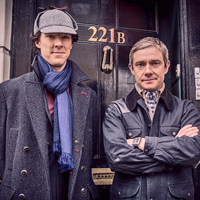
- From: Canada
- Registered: May 5, 2015
- Posts: 3,882
Re: Why I'm now convinced Sherlock didn't fall for Irene
Hmmm...interesting analysis! It's hard to think of much to say, since you've already said so much!
I would agree that Sherlock didn't fall for Irene, not entirely anyway or not in the way one might think. He was definitely playing her game, and some of his moved appeared to be like he was interested in her sexually but were really something else (like the pulse-checking).
We do know, however, that Irene does reappear in his mind palace even when he doesn't want her to (Sign of Three). So, the thought of her still comes back to him now and again, even inconveniently. Perhaps it's sadness that she's gone, she who was such an interesting person? Or there was something he felt for her? Or does she represent something for him? It's during the deduction/discussion with the women who thought they had dated a ghost that she appears, if memory serves me correctly. Could this have called back Irene's sexual prowess? And what does that entail for Sherlock? Is it just that she represented both sexual and intellectual energy? Or does she appear because he has to consider these two things together once again with the Mayfly Man case?
I realize with this I've steered off the trail of your analysis of just Scandal in Belgravia, but obviously Irene meant something to Sherlock, and I feel like it's pertinent information to consider.
Last edited by Yitzock (May 15, 2015 5:33 pm)


Clueing for looks.
- Liberty
- Moderator
 Offline
Offline 
- Registered: June 29, 2014
- Posts: 5,982
Re: Why I'm now convinced Sherlock didn't fall for Irene
I do think Sherlock fell for Irene, and that the episode is showing his emotional development through this, but your posts are really interesting!
A couple of things you bring up Unkaunz: John getting bored and setting off the fire alarm, and Sherlock not remembering Irene's name and calling her "the woman", are directly from the story. In the story and in the TV version, the point of the "fire" is to make Irene reveal where she's hidden what Sherlock's after. In the story, there's a feeling that Sherlock calls Irene "the woman" because she's above the rest of her sex, not because he can't remember her name. And I think that in the TV version it also signifies that she's something special (I like the way they play with the pronunciation: the woman, the woman). In the story, Irene is great at disguise, and manages to fool Sherlock by cross-dressing. I like the twist in the TV version, that Irene disguises herself by appearing naked, removing all the clues that Sherlock would have picked up from her clothing.
I think Sherlock's reaction to her nudity is mainly about that: he's impressed by how clever it is, and that it's playing him at his own game. But I do think there's attraction there as well. Benedict confirms that when he stumbles over his words it was because he sensed competition from John (Irene was paying attention to him) and wanted to impress Irene. (I don't want to stray too far into Johnlock debate territory, but even without Benedict's confirmation, I think it's clear that Sherlock doesn't usually stammer like this when John is with women - he only does this around Irene, so it's Irene who triggers it, not John).
The same with Sherlock showing off, resulting in the information being sent to Moriarty - he's trying to impress Irene.
Identifying Irene's body: I've posted about this on another thread and I know not everybody agrees (wouldn't it be boring if we did!), but I don't think it's likely that he made a mistake. He knew it wasn't Irene and was covering for her. She must have placed the phone on the mantelpiece, then texted him so that he would find it. At the time that she texted she was alive, so why would Sherlock tell Mycroft to expect a body, if he believed she was in danger and he could be trying to save her instead (at LEAST answering the text or phoning back)? I think because he was trying to protect her. She wanted to "disappear" and he colluded with her.
There's lots more I'd like to answer, but don't want to make this a huge post! Loved your post - might get back to it later ![]() .
.
- Yitzock
- Stayin' Alive
 Offline
Offline 
- From: Canada
- Registered: May 5, 2015
- Posts: 3,882
Re: Why I'm now convinced Sherlock didn't fall for Irene
Liberty wrote:
I do think Sherlock fell for Irene, and that the episode is showing his emotional development through this, but your posts are really interesting!
A couple of things you bring up Unkaunz: John getting bored and setting off the fire alarm, and Sherlock not remembering Irene's name and calling her "the woman", are directly from the story. In the story and in the TV version, the point of the "fire" is to make Irene reveal where she's hidden what Sherlock's after. In the story, there's a feeling that Sherlock calls Irene "the woman" because she's above the rest of her sex, not because he can't remember her name. And I think that in the TV version it also signifies that she's something special (I like the way they play with the pronunciation: the woman, the woman). In the story, Irene is great at disguise, and manages to fool Sherlock by cross-dressing. I like the twist in the TV version, that Irene disguises herself by appearing naked, removing all the clues that Sherlock would have picked up from her clothing.
I think Sherlock's reaction to her nudity is mainly about that: he's impressed by how clever it is, and that it's playing him at his own game. But I do think there's attraction there as well. Benedict confirms that when he stumbles over his words it was because he sensed competition from John (Irene was paying attention to him) and wanted to impress Irene. (I don't want to stray too far into Johnlock debate territory, but even without Benedict's confirmation, I think it's clear that Sherlock doesn't usually stammer like this when John is with women - he only does this around Irene, so it's Irene who triggers it, not John).
I like what you say here. I also like how they used stuff from the original stories here, putting their own spin on it.
Thanks for including what Benedict said about the scene, I did not know that before, and intresting to know. And it does make sense. I think Sherlock did want to impress Irene, and play the game, because she is like him - she has a strong mind.


Clueing for looks.
- Liberty
- Moderator
 Offline
Offline 
- Registered: June 29, 2014
- Posts: 5,982
Re: Why I'm now convinced Sherlock didn't fall for Irene
Yes, she reflects him a lot - the disguises, the deduction, wearing his iconic coat, wearing his dressing gown, using a riding crop, etc. I think that's quite clever - she knows what he likes and as he's a bit of a narcissist, well ... I think she gets him to fall for her by being a mirror. I think they're actually quite different, but they parallel each other in many ways throughout the episode. Eventually, they both lose because of falling for each other (and later, both win too).
The commentary is interesting. If you don't have it, there's a transcript at Arianne De Vere.
- ukaunz
- High Functioning Sociopath
 Offline
Offline 
- From: Australia
- Registered: February 13, 2015
- Posts: 2,584
Re: Why I'm now convinced Sherlock didn't fall for Irene
Liberty wrote:
I do think Sherlock fell for Irene, and that the episode is showing his emotional development through this, but your posts are really interesting!
A couple of things you bring up Unkaunz: John getting bored and setting off the fire alarm, and Sherlock not remembering Irene's name and calling her "the woman", are directly from the story. In the story and in the TV version, the point of the "fire" is to make Irene reveal where she's hidden what Sherlock's after. In the story, there's a feeling that Sherlock calls Irene "the woman" because she's above the rest of her sex, not because he can't remember her name. And I think that in the TV version it also signifies that she's something special (I like the way they play with the pronunciation: the woman, the woman). In the story, Irene is great at disguise, and manages to fool Sherlock by cross-dressing. I like the twist in the TV version, that Irene disguises herself by appearing naked, removing all the clues that Sherlock would have picked up from her clothing.
Thank you. Yep, I've read the ACD story ![]()
I didn't say John got bored and lit the fire. I know it's part of the plan Sherlock came up with prior to meeting Irene (and the same plan he uses in the original story, along with his vicar disguise). I was just saying Sherlock talks to Irene about the dead hiker to pass the time while he waits for the alarm to go off. I also remember that Irene Adler dresses as a boy in the story and says a cheeky "Goodnight Mister Sherlock Holmes" as she walks by, just when he thinks he's fooled her. Irene uses the same line of dialogue in ASiB as she escapes out the window after drugging Sherlock. I like how they changed it to her appearing in her "battle dress" (naked) to confuse Sherlock.
I also know what you mean about Sherlock considering Irene to be above the rest of her sex and calling her The Woman as a salute. But if you watch the scene where Sherlock wakes up in his bedroom and starts saying "the woman... the woman woman", it's clear that he can't remember her name, he's frustrated that John doesn't know who he's talking about, and then John says "Irene Adler" and Sherlock makes a gesture like "yeah, her, thank you". It's not until the end of the episode that he refers to her respectfully as The Woman, or The Woman.
I'll have to come back to your other points later.
----------------------------------------------------------------------------------------------------------------------------------------------------


- •
- Liberty
- Moderator
 Offline
Offline 
- Registered: June 29, 2014
- Posts: 5,982
Re: Why I'm now convinced Sherlock didn't fall for Irene
Ah, I misread what you'd said as John setting off the alarm to pass the time! I'm sorry, and I see what you mean now. I still think Sherlock calling her "the woman" even at that point is a reference to the story, rather than to show his lack of interest. He has just seen and heard Irene in his room, and he seems puzzled that John doesn't know who he's talking about. From Sherlock's drugged perspective, surely John would know that Irene was in the house?
At that point, of course he finds her interesting. How many people could do a Sherlockian deduction? (She knows what people like). Mycroft and John seem to think he he is very interested in her, even without knowing about that deduction: they both worry about him after her death, although he has only met her briefly (and even though Mycroft didn't initially think she was a risk to Sherlock). So even though neither of them are sure how much he feels for her, both of them can see that this is something different.
I do think there's an awful lot of bluffing going on in the episode, on Irene's part and on Sherlock's part. But I don't think he's bluffing when he solves the code and inadvertently sends the information to Moriarty. It's a genuine mistake, and happens because he's trying to impress Irene. If he hadn't found her compelling, he wouldn't have done that. His cold words about love and sentiment are about himself as well, I think - the whole experience confirms for him that falling for somebody isn't compatible with his work.
Last edited by Liberty (May 16, 2015 9:04 am)
- tykobrian
- Cipher Expert
 Offline
Offline 
- From: Ḅạṇġlạḍėṣḣ
- Registered: February 3, 2014
- Posts: 135
Re: Why I'm now convinced Sherlock didn't fall for Irene
The following two posts raise some very interesting points. I'm spoiler tagging them since they're rather long.
Often, when writers set out to create another Sherlock Holmes adaptation, they decide to use Irene Adler as his love interest, despite the fact that she only actually appears in one canonical story. Why? Because she’s beautiful and clever. So naturally canon-Sherlock was in love with her. Of course, anyone who actually bothered reading the story knows that isn’t the case at all. Canon Sherlock Holmes is intrigued by Irene. She’s highly intelligent and she outsmarts him. He keeps a photograph of her as a souvenir once they part ways as a reminder of the woman who beat him. If I had to make a list of guesses to Canon Sherlock Holmes’s sexual orientation, “straight” wouldn’t even crack the top five. So it irks me to no end that people assume his interest in Irene must be sexual. God forbid he really is just impressed with her mind. Who cares how powerful her brains are?? Look at her boobs, for chrissake!
There was no romance between them in the canon story. Period.
I imagine Moffat and Gatiss were beside themselves with glee when they wrote this episode. They made it through the first season loading all three shows with crazy homoerotic subtext, setting up the beginning of their slow build to Johnlock, reading reviews and criticism that pointed out All The Gay while at the same time heralding it a fine bromance, with a minority of fans crying “queerbait.” Queerbaiting? the writers thought. No no no. Quite the opposite, dears. Just you wait.
Enter: The Woman.
She’s sexy and she’s smart, which means 99% of people will misread her right off the bat (this holds true in real life, too!). It’s too confusing when women are intelligent and beautiful. We’re supposed to believe these two things are mutually exclusive when it comes to the fair sex. (Throw a little confidence in there and people really start to flip their shit.). Mofftiss really played up Irene’s sexuality, too. A dominatrix. A gay dominatrix. Yowza.
A gay dominatrix…..who’s attracted to Sherlock. Hmm.
This bothered me for awhile. I think it bothered a lot of people. Of course they wrote the lesbian falling for Sherlock. Ugh. Why would they do that? Why indeed? Actually, there’s an answer to that. The writers are heterobaiting. They’re heterobaiting hardcore. It’s not just that Irene’s character serves to force John and Sherlock to confront their own sexualities. It’s that the writers relied on Irene’s attraction to Sherlock, her beauty, and good old heteronormative assumptions to bait viewers into seeing a mutual sexual attraction when in fact Sherlock never shows signs of interest in Irene’s body, only in her brain.
I know, I know. It’s possible for a man to know a gorgeous, brilliant woman and not want to have sex with her?! What madness! Lunacy! Almost as insane as the idea that a “not gay” man might one day find himself attracted to another man! Despite the fact that these two things happen all the time in real life, when it comes to entertainment – books, film, television – society views everything through the lens. The sexy, brainy gal is the hero’s love interest. The soldier who has had lots of girlfriends would never develop those kinds of feelings for another dude. We have our cookie cutters and we demand the same cookie shapes every time.
It’s all so…ordinary. Boring.
I love Irene Adler’s character because she perfectly illustrates the powerful effect of the heteronormative lens. I like to think I’m pretty aware of this stuff, but this episode tripped me up for a long time.
That’s Sherlock’s face the first time he sees Irene. Yes, he’s shocked. She’s naked. He’s also looking at her face, not her body. He continues to do this.
I won’t gif the entire scene, but Sherlock maintains eye contact with Irene. He does, amusingly, roll his eyes when John first walks in. Because he’s seen what John looks at on his laptop (he’ll talk about the porn during this scene, actually) and he knows John’s going to be a little…ahem, taken aback? by this naked woman.
Here’s something funny. When Sherlock’s trying to do deductions, he hurries up Irene’s body and focuses on her face.
He can’t read anything, so he practices on John…focusing on his body and his lips.
Then he (turns back to Irene? nope) practices on John some more. Oooh, let’s start with his crotch and end with a conclusion about his romantic life!
Okay but for real, this is a case, so let’s try (deducing Irene? nope) take a closer look at John’s purdy eyes and mouth.
OKAY SERIOUSLY Irene’s turn. Never mind her naked body, though. Just the face again.
Do you see how amazing this is? Sherlock gives a quick, microsecond glance up Irene’s body and focuses on her face. Failing to deduce anything, he focuses on all parts of John’s body for an extended period of time. Then he glances back at Irene’s face. And viewers come away from this thinking HAHA, the hot naked chick totally floored him!
*~*~Behold, The Distortive Powers of the Heteronormative lens~*~*
This scene is filled with all kinds of goodness, but there’s only one more moment here I want to look at.
“Brainy’s the new sexy.”
“Vvvshhvsicof.”
Ooh, Irene’s line about finding smart people sexy got a reaction out of Sherlock! He’s in luuuurve! Except…back up.
“I know one of the policemen…well, I know what he likes.”
Interesting…so Irene’s gay, but she does have sex with men. Cool concept, right John?
“Oh, you…like policemen?”
SIGH. Just as Sherlock thought, John’s getting all charmed by this sexually assertive woman. Damn John and his laptop porn and his thing with naked ladies and their lady parts.
“I like detective stories. And detectives. Brainy’s the new sexy.”
WHAT THE HELL ARE YOU SMIRKING AT JOHN
“Vvvshhvsicof.”
That’s the exact moment this happens. When Irene directs her flirtations at John, and John likes it. That’s when Sherlock momentarily loses power of speech. Which he quickly regains, only to begin describing how he figured out the hiker mystery at top speed and with great cockiness. Because John likes when he does this and John needs to pay attention to him, dammit.
Here’s the really beautiful thing. Throughout this episode, the writers mess with our heads even more by having John seem convinced Sherlock is romantically/sexually interested in Irene, despite Sherlock showing no such signs. Of course John thinks this – like most people, John can’t conceive that Sherlock wouldn’t be interested in this woman, who not only has his brains, but is dead sexy, too. (That heteronormative lens? John’s looking through it bigtime, so viewers are as well. Brilliant heterobaiting is brilliant.)
Now about Sherlock’s composing “Irene’s theme” in his grief over the death of this woman. I mean, that’s certainly what John thinks he’s doing.
- You Composing?
- Helps me to think.
Sherlock starts playing the tune, and John stays silent for a moment. Swallowing his jealousy, he finally asks.
- What are you thinking about?
And Sherlock avoids the question. Except not really. He tells John exactly what he’s thinking about.
- The count on your blog is still stuck at 1895.
Sherlock’s laptop has been opened to John’s blog this whole time. They even give us a shot of the blog post.
You can read that exact post on John’s blog. It’s about a case in which a gay guy killed his boyfriend.
I can’t cover this any better than loudest-subtext-in television did. In sum: Sherlock’s pining, his composing, his depression and his switching from patches to cigarettes are always because of his feelings for John. So far in this episode, Sherlock’s talked about confiscating John’s laptop because of all the naked women he looks at. He’s talked about reading John’s emails to his girlfriends. From the TSoT flashback, we see this is also around the time he’s going nuts trying to figure out John’s middle name. And here is is, composing sad music while he thinks. What is he thinking about? Most recently, this post on John’s blog about a gay guy who killed his boyfriend.
Sherlock’s obsession has always been with John, no one else. (The showrunners are going to do something extraordinarily brilliant with his “Irene” composition in a little bit here.)
Please know that I’m not saying Sherlock didn’t care about Irene’s death. Or that I literally think he was composing a sad tune based on a case on John’s blog. I think Sherlock respects Irene, is fascinated and infuriated by her (because she beat him), and is frustrated and saddened that she died. That doesn’t mean he wants to feck her. I mean, I can think of lots of people in my life who I don’t want to feck, yet I’d be sad if they died. (Am I being too sarcastic? Sorry.) What I’m saying is that Sherlock’s moodiness is usually due to lack of mental stimulation, roadblock on a case, pining over John, or all of the above. This incident is no different. And John agrees in Battersea, "He does all that anyway..."
Jump to the Battersea scene. Viewers, myself included, are often confused by this scene at first. What the hell are they actually talking about? It all sounds so cryptic! It’s not, though. John’s just confusing things with his damn lens. Irene flirted with Sherlock Holmes?! So there is something going on!
Hilariously, Irene flat out tells John and the viewers that this attraction is not mutual. ”At him. He never replies.” John goes on and on about how Sherlock always replies to everything, and Irene mildly wonders if that makes her special. John says maybe. And Irene hits the nail on the head.
- Are you jealous?
- We’re not a couple.
Uh…nice job answering the wrong question, John. Seriously, is jealousy something only experienced by couples? He side-stepped that one pretty clumsily. Irene doesn’t even bother forcing him to answer (his jealousy is obvious). Instead, she gets to the heart of the matter.
- Yes you are.
John defaults to his standard “not gay” response. Irene comes back with this:
- Well I am. Look at us both.
Translation: “We both like women, and we both like Sherlock.” That’s what Irene meant. And here’s John’s reaction.
He gives a short, frustrated laugh, looks away, and nods. Is he exasperated? Yup. Why? Because for as long as he’s lived with Sherlock, people have made this assumption. Although no one has spelled it out as clearly as Irene. She acknowledges he’s not gay. And she flat-out says it doesn’t matter when it comes to John’s feelings for Sherlock. John’s exasperated, tired, frustrated…because he knows she’s right.
~sexual sigh~
Sherlock’s overheard the whole thing – he heard Irene say both she AND John have feelings for Sherlock. He leaves, John starts after him, Irene stops him. John (and the viewers) are shocked that Sherlock was there, and dying to know what he thought of what Irene said. Look at the transition from Irene and John to Sherlock.
It’s so literal. John’s pained, emotional face. Fade to black. Suddenly Sherlock appears, opening his eyes – indicating he’s thinking about John. That’s how transitions work. This isn’t just fade to black, next scene. The music is swelling, this is climactic, a realization. Sherlock’s eyes are literally and metaphorically opening thanks to what he just overheard, and viewers jumped to the conclusion that it was Irene’s admitting her feelings for him that led to this. But it’s not Irene he’s thinking of. It’s John. She’s not even a part of the transition. Furthering the mindfuck, John’s theme and Irene’s theme become intwined at this moment. It’s pretty epic. Why did they do this? Well, first off, it helps further the confusion and assist the heterobaiting. People will hear the theme and assume Sherlock’s thinking of Irene. At Battersea, Irene forced John to confront his feelings for Sherlock.John didn’t deny them. Sherlock heard this and his mind was blown. And now that theme represents not Irene, but sexual/romantic confrontation with John. That’s why we hear it and see naked Irene facing Sherlock in his mind palace in TSoT right before he realizes he’s in love with John. This is what Irene represents.
Sexual/romantic confrontation.
Let’s skip down to a few more highlights from ASiB. There’s the kiss on the cheek. Irene moves in, and we cut to…um, John? Looking jealous?
John sets his cup down rather hard as Irene kisses Sherlock’s cheek. Sherlock (blushes like a schoolgirl? nope) gives her a wtf look.
Irene told him to “impress a girl.” So naturally, Sherlock goes off an impressive deduction ramble then stares deep into (her eyes? nope) John’s eyes.
He then LITERALLY TELLS IRENE that he does not want her praise because he has John’s praise.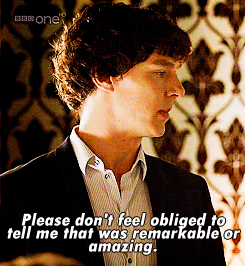
- Please don't feel obliged to tell me that was remarkable or amazing. John's expressed that thought in every possible variant available to the English language.
Sherlock stares Irene down at the end of the deduction because she’s trying to be seductive, and the last time she did that, she jabbed a syringe in his neck and beat him. Sherlock TALKS TO JOHN while Irene threatens to make him beg for mercy, and then tells Irene very clearly, “I’ve never begged for mercy in my life.” We have no reason to think Sherlock would be into that, and he’s telling her quite flatly it’s NOT GOING TO HAPPEN. He’s not flirting.
There’s so much more in this episode, but I can’t possibly gif it all. When Sherlock wakes up after Irene drugs him, the first thing he does is call for John. When he spaces out in front of the fire then says “Coventry,” he’s surprised when Irene, not John, is sitting there, and then ignores her question only to ask where John went.
Perhaps most tellingly, when he accurately deduces that Irene is in love with him, he (reciprocates? nope) coldly destroys her for it while still working in a reference to John, who isn’t even there and who no one else has mentioned (I imagine John Watson thinks love is a mystery to me) – this shows the Battersea conversation is still on Sherlock’s mind, when John said who the hell knows about Sherlock Holmes, but if anyone out there still cares, I’m not actually gay. Sherlock leaves Irene devastated, essentially sentencing her to death in six months. Even Mycroft looks startled by Sherlock’s malevolence.
So why does he end up saving her life?
Because he can’t stand to let people die, as evidenced by the first series but The Great Game in particular. His conscience got to him once he cooled down, and that’s basically it. Sherlock is also glad to have evidence that it’s possible for people to be in love with him, because his self-esteem in that regard is shit. And it was an excuse for an adventure.
He keeps her phone as a souvenir – a canon reference, a reminder of “the woman who beat him.” Job well done, case closed, and we know from TSoT that they haven’t been in touch since. (God knows where she is.)
A final point: Did they sleep together after he rescued her? Mofftiss and the actors have been asked this in interviews. I bet they find it really amusing. Because Sherlock never, once, EVER, shows the slightest bit of sexual or romantic attraction to Irene. But she’s hot! So clearly he nailed her! Because she was the hot naked chick! And he rescued her! Sex is his reward!!!
They did such an incredible job heterobaiting on this one. (John fell for it too, poor bastard.) And the truly hilarious part is the writers gave us the answer to that question – did Sherlock sleep with Irene. Get ready for a sexual metaphor with all the screaming subtlety of “meat dagger.”
Look at Sherlock saving Irene, our last shot of them together.
He swings a sword at her…
and intentionally misses.
So…yeah. With Ms. Adler, Sherlock’s sword went “unused.”
___________________________________________________________
Irene Adler: The Woman, the Myth, the Meta by deducingbbcsherlock
My favorite thing about ASIB is the fact that the weird jealousy love triangle that exists was constructed the way that it was. The wiles and manipulation of Irene Adler would have worked equally well, and we could have gotten some great character development/jealousy bits from John, if they had approached it as John being, “Oh hey look, I’m clever too! I’ve got a website! People visit it! I’m a doctor and a soldier and I’ve been to Afghanistan! Senpai Irene please notice me!” It would not be far fetched at all since John is the serial dater and all. And frankly, it would have been the most easily accessible way to convey the power that she has to manipulate people and situations to her advantage, from a heteronormative standpoint: two best friends, torn apart by a girl. It’s been done so many times before because it’s a trope that works.
But what do we get instead?
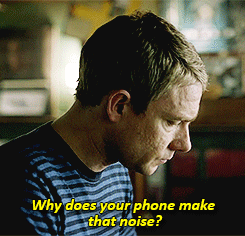
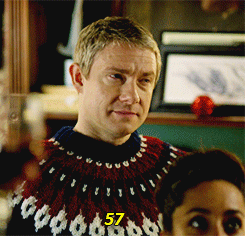
Now, this could, of course, still be construed fairly ambiguously, and, left as is, could have even been fine evidence of the Two Guys and a Girl trope that I mentioned earlier, with Sherlock and John as the Two Guys, torn apart by the Girl - in this case, Irene. In fact, there is a line that supports that heteronormative idea early on:
But context is important, and just before that, we get this:
JOHN: Right, this should do it.
(He stops dead in the doorway as he lifts his eyes and sees the suggestive scene in front of him. Irene looks round to him, the dog collar still in her teeth. John looks at her awkwardly, then down at the bowl before looking up again.)
JOHN: I’ve missed something, haven’t I?
(Irene takes the collar from her teeth.)
IRENE: Please, sit down.
(She steps back from Sherlock, who fidgets uncomfortably on the sofa as she walks away.)
IRENE: Oh, if you’d like some tea I can call the maid.
SHERLOCK: (Snarling) I had some at the Palace.
IRENE: I know.
(She sits down in a nearby armchair and crosses her legs, folding her arms gracefully to obscure the view of her chest.)
SHERLOCK: Clearly.
(They stare silently at each other for several seconds, weighing each other up. John looks at them awkwardly.)
Typically, in scenarios like these, on television and in films, the response to such visual stimuli is something like this:
NOT something like this:
And thus sets the stage for the actual cast of characters in the Two Guys and a Girl trope being executed in ASIB: John and Irene as the Two Guys, with Sherlock as the Girl in question. (Don’t think too hard about the gendering of the characters. They’re just the labels used for the archetypes in the trope and have nothing to do with actual gender characteristics of any players involved.)
From TV Tropes:
“The girl, who usually owns the Amulet Of Extreme Plot Significance
…gets kidnapped a lot or is probably fought over by the two guys
JOHN: You … flirted with Sherlock Holmes?!
IRENE (still looking at her phone): At him. He never replies.
JOHN: No, Sherlock always replies – to everything. He’s Mr Punchline. He will outlive God trying to have the last word.
IRENE: Does that make me special?
JOHN: … I don’t know. Maybe.
IRENE: Are you jealous?
JOHN: We’re not a couple.
IRENE: Yes you are.
… usually via their own clashing ideas on how to protect her or just romantically”
JOHN (quietly): Who … who the hell knows about Sherlock Holmes, but – for the record – if anyone out there still cares, I’m not actually gay.
IRENE: Well, I am. Look at us both.
This trope is usually necessary to create tension between two people in a story who are on their way to becoming romantically involved, as an obstacle to promote character development and conflict. We saw this at the end of TGG: Sherlock and John are bantering about how “people will talk”, and then immediately at the beginning of ASIB, they’re shown as being more familiar with one another than in any other episode thus far:
This is the communication style of two people who are so familiar with one another that they are in their own world, with everyone else existing outside of it. Directly after this scene, we are introduced to Irene properly, and Two Guys and a Girl begins. Tension is created.
Now that we’ve established that the trope used to design the episode is Two Guys and a Girl, let’s more closely examine Irene’s role in this. If she isn’t the Girl, then who is she? She is clearly the Romantic False Lead:
“This is the love interest’s love interest; the person brought in, either for an episode or an arc, to date the one that the main character (or just a character) is in love with.
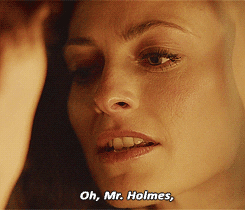
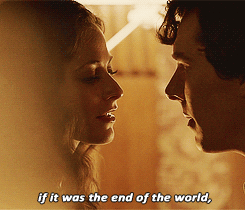
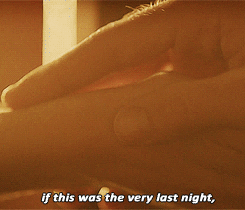
The smitten character will be jealous, take an instant dislike to him (often being blind to what attractions he does have), and do whatever they can to sabotage the budding relationship.”
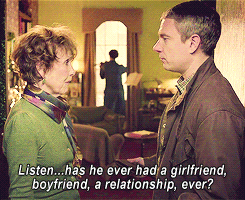
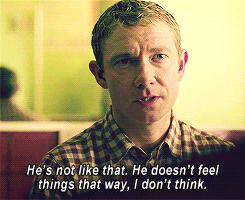
So, if Irene is not the Girl, but is instead the Romantic False Lead who is being pitted against John in a Two Guys and a Girl scenario (complete with the Cock Fight at Battersea between them)… what conclusions can we draw about what the story is setting up for Sherlock and John?
____________________________________________________
Tropes In ASIB: Two Guys And A Girl..? by johnvvatsonblog
Last edited by tykobrian (May 17, 2015 12:47 pm)
-----------------------------------------------------------------------------------------------------------------------------
Series arc of Sherlock | Clues to #johnlock being endgame | My fav Sherlock blog

- Liberty
- Moderator
 Offline
Offline 
- Registered: June 29, 2014
- Posts: 5,982
Re: Why I'm now convinced Sherlock didn't fall for Irene
Your posts read to me more as making a case for Johnlock, rather than about Sherlock falling for Irene (this is an observation, not a criticism ![]() ). I don't actually think the two are necessarily incompatible. I don't see Johnlock, so I can't speak from that point of view, but it's not impossible for somebody to be attracted to more than one person, romantically, sexually, etc. Even in The Private Life of Sherlock Holmes, where it's strongly suggested that Sherlock is gay and in (unrequited) love with John, he does fall for the Irene Adler-type woman in a way. So Johnlock doesn't have to rule it out.
). I don't actually think the two are necessarily incompatible. I don't see Johnlock, so I can't speak from that point of view, but it's not impossible for somebody to be attracted to more than one person, romantically, sexually, etc. Even in The Private Life of Sherlock Holmes, where it's strongly suggested that Sherlock is gay and in (unrequited) love with John, he does fall for the Irene Adler-type woman in a way. So Johnlock doesn't have to rule it out.
I think something that gets missed as well, is that if Sherlock does fall for Irene, then of course it's going to be hidden - he represses those feelings to preserve his mind, and would also hide them from Irene. That's going to make the scenes more ambiguous - is he genuinely not attracted, or is he trying to hide the fact that he's attracted?
I think the slip-up over the code is one of the things that indicates that it's the latter. He likes impressing John, but it doesn't affect his judgment ... and John has been in his life for quite a while now, and has been helping him with cases, he's used to impressing John and being admired by John without any dangerous side effects. Irene is the factor that's different here. (And again, even if Johnlock was the case, Sherlock has no reason to lose his judgment because of John at this particular point).
Your point about Sherlock stumbling over his words because he's trying to get John's attention is similar. I think I posted something about it above, but we do see John paying attention to women and women paying attention to John at other times, and Sherlock doesn't do this. Again, it's Irene who is the new factor, not John. The only time this happens is when John and Irene are paying attention to each other, not John and anybody else. This isn't about heteronormativity - it's just seeing it in the context of what else we've seen between the characters. (If Irene was male, the character would still be the new factor, not John).
I mentioned what Benedict said in the commentary, here's the quote (from Arianne de Vere): I do love the only moment [Sherlock] verbally stumbles – and I sort of did it deliberately – was because [he] sensed a bit of competition in Watson starting to turn on the charm, and in trying to desperately get in there to impress you, I went, [he talks gibberish]. "You" is Lara: Martin isn't there. It's Irene he's trying to impress, not John. And it's the same when solving the code.
Even the pulse-taking suggests that Sherlock is interested rather than not. Why else would he do it? He doesn't need the information for the "game" at that point - in fact, it's only later that it strikes him how he can use that information against Irene. That suggests that at the time, he is genuinely interested in whether Irene is really attracted to him or not. He knows she uses seduction in her "work", and wants to know if it's all disguise or if she does actually feel something for him.
I think we're seeing somebody who almost religiously represses this kind of emotion, unexpectedly falling for somebody, outwardly still repressing it but inwardly losing a little control. For both of them (Sherlock and Irene), falling for each other is a dangerous disadvantage - that's when they make bad judgments, and find themselves on the losing side. It's another way in which Irene mirrors him.
Last edited by Liberty (May 17, 2015 3:14 pm)
- lil
- British Government
 Offline
Offline - Registered: June 19, 2013
- Posts: 645
Re: Why I'm now convinced Sherlock didn't fall for Irene
Since seeing Sherlock...go teenagery , go through puberty ,and then mature in series three , I think watching Sherlock with any kind of romantic or sex goggles on pre hiatus is a mistake .At this point in the game Sherlock is still an emotional child and just not interested at all .When Sherlock says nakedness bores him and it's all about the brain/thinking for him - I believe him.
I never thought Sherlock had romantic feelings for Irene , more of an interesting new brain admiration as he has with Moriarty , though the speculation was fun at the time..but hindsight...does make it look a bit clearer.
- Ah-chie
- British Government
 Offline
Offline 
- Registered: December 17, 2014
- Posts: 757
Re: Why I'm now convinced Sherlock didn't fall for Irene
I totally agree with your post Liberty! Especially the part where you quote BC as to how he played the scene.
When you have the actor himself being very clear about his interpretation of the scene (and one which the producers/director/creators deliberately left in with the final cut, indicating that they approved of his interpretation) then that leaves very little doubt IMO as to any other way of seeing how Sherlock is affected by the presence of Irene in that scene in particular, but also in the episode as a whole (unless you are like the person(s) commenting in tychobrian's post and have chosen to interpret it in a way that fits with a particular viewpoint).
And I have to also add that BC has consistently maintained that Sherlock was attracted to Irene - as witnessed by his cheeky comments about his insistence at the recent Sherlocked convention that he imagines Irene and Sherlock had a "night" together after he rescued her. Though to be fair, this last part is pure speculation on his part (although I am prone to put weight behind a speculation about a character's motivations and actions by the person who actually plays Sherlock ahead of just about anyone - except maybe the writers). ![]()
Anyway, well done on a fine, clearly thought out post!
-Val
"The only shipping I know is shipping containers."
-Benedict Cumberbatch
- Vhanja
- One More Miracle
 Offline
Offline 
- From: Sandnes, Norway
- Registered: December 11, 2014
- Posts: 6,607
Re: Why I'm now convinced Sherlock didn't fall for Irene
I wrote a long and detailed post about this a few days ago, but then I clicked the wrong buttons and it was all gone. So I will try again:
To me, Sherlock never fell in love with Irene. He never had a crush on her, and certainly doesn't love her. However, as I see it, Irene was the first person to show him the possibility of a world he has deliberately shut himself out off.
I believe he was - against his own will - physically attracted to her. And intimidated by her strong coming-on's, as he didn't know how to handle it. I don't think he fell in love with her, but I think he was almost about to. Meaning that she was the one who managed to slightly open the door that he had so tightly shut, showing him just a short glimpse of "what-could-have-beens". Of what emotions could have been available to him, had he chose to go down that path. But both he and Irene herself closed shut that door by the end of the episode. However, I believe he started to feel. And that was enough.
I don't put too much weight on him faltering when he saw her naked. I am straight, but I would falter myself if a woman, a stranger, would enter a room naked. Because it would go against all sociological codes and norms, and my expectations. Not because I was sexually or romantically attracted to her.
But it's clear that his usual arrogant and aloof demeanour falters whenever she makes her advantages. He doesn't know how to answer to them. And the fact that he can't just easily brush it off tells me that he is intimidated by it. Also, the fact that he can't, or won't, tell John anything about what he feels regarding her death and then her return, tells me that he DOES feel something.
I think that if he felt absolutely nothing for her, nothing beyond intellectual curiousity, he would have no problem dismissing her forward flirting without hesitation, and he would just scoff irritably at John's queries into his well-being. But he is uncomfortable around her, and shut John out. That tells me that something is going on.
However, I am also in the camp thinking he doesn't fall in love with her. Not really. But he is about to. And I think his silence to John comes from that fact. She opens a door to a world he has shut himself out of, and that scares him. And then she's gone, and he can safely shut the door again.
I also think he is sexually attracted to her, and again not sure how to handle it. If he wasn't, he would never be that uncomfortable around her and her advances. In my opinion.
Last edited by Vhanja (May 17, 2015 6:28 pm)
__________________________________________________________________________________________________________________________________________
"We'll live on starlight and crime scenes" - wordstrings

Team Hudders!
- mrshouse
- Stayin' Alive
 Offline
Offline 
- Registered: January 16, 2014
- Posts: 3,802
Re: Why I'm now convinced Sherlock didn't fall for Irene
I like your post, Vhanja.
I like that you politely state your point of view without dismissing how others might feel differently - which is one of the forum's purposes- and mark it clearly as your personal view.
Thank you.
------------------------------------------------------------
Eventually everyone will support Johnlock.
"If you're not reading the subtext then hell mend you" - Steven Moffat
"Love conquers all" Benedict Cumberbatch on Sherlock's and John's relationship
"This is a show about a detective, his best friend, his wife, their baby and their dog" - Nobody. Ever.

- ukaunz
- High Functioning Sociopath
 Offline
Offline 
- From: Australia
- Registered: February 13, 2015
- Posts: 2,584
Re: Why I'm now convinced Sherlock didn't fall for Irene
I second that, mrshouse ![]()
Thanks to everyone who has replied to my post. It's thoughtful answer like these that almost make me rethink my new viewpoint on the Johnlock debate ![]() I frequently wobble on the fence in debates like this! But I just find the metas I've read recently so convincing. I guess I will just have to wait for the spesh and S4...
I frequently wobble on the fence in debates like this! But I just find the metas I've read recently so convincing. I guess I will just have to wait for the spesh and S4...
----------------------------------------------------------------------------------------------------------------------------------------------------


- •
- Vhanja
- One More Miracle
 Offline
Offline 
- From: Sandnes, Norway
- Registered: December 11, 2014
- Posts: 6,607
Re: Why I'm now convinced Sherlock didn't fall for Irene
Thanks, guys, that's a nice feedback. ![]()
(I personally don't find that my views on Sherlock and Irene will exclude Johnlock).
__________________________________________________________________________________________________________________________________________
"We'll live on starlight and crime scenes" - wordstrings

Team Hudders!
- mrshouse
- Stayin' Alive
 Offline
Offline 
- Registered: January 16, 2014
- Posts: 3,802
Re: Why I'm now convinced Sherlock didn't fall for Irene
I also agree with this, Vhanja.![]()
There has already so much been said about Sherlock and Irene. In my opinion not every aspect needs to scream Johnlock...![]() I think there are a lot of users here who see something between Sherlock and Irene. But what it is, being in love, being intellectually stimulated, being just confused by Irene crossing the borders of social norms, being bemused by a whole new world to see... who knows, maybe a bit of everything or nothing of that at all. It's not that simple. All that doesn't rule out of falling deeply and romantically for John till the end of his days.
I think there are a lot of users here who see something between Sherlock and Irene. But what it is, being in love, being intellectually stimulated, being just confused by Irene crossing the borders of social norms, being bemused by a whole new world to see... who knows, maybe a bit of everything or nothing of that at all. It's not that simple. All that doesn't rule out of falling deeply and romantically for John till the end of his days.![]()
And as a last one: I do not see at all, why a bachground story ben made purely up by himself too deepen his character because he was refused a back story by Moffat should be more of a confirmation of something than Moffat talking about a scene he wished he had included which is a whole different aspect or the actress Lara Pulver talking about her role as "comin between the happy couple"![]()
Last edited by mrshouse (May 18, 2015 11:00 am)
------------------------------------------------------------
Eventually everyone will support Johnlock.
"If you're not reading the subtext then hell mend you" - Steven Moffat
"Love conquers all" Benedict Cumberbatch on Sherlock's and John's relationship
"This is a show about a detective, his best friend, his wife, their baby and their dog" - Nobody. Ever.

- Vhanja
- One More Miracle
 Offline
Offline 
- From: Sandnes, Norway
- Registered: December 11, 2014
- Posts: 6,607
Re: Why I'm now convinced Sherlock didn't fall for Irene
I think it's interesting to see that Ben and Moffat seem to have quite different views on Sherlock's feelings (or non-feelings) towards Irene. Which of these two do we give more weight? The actor or the creator? Or perhaps the one we agree with ourselves?
__________________________________________________________________________________________________________________________________________
"We'll live on starlight and crime scenes" - wordstrings

Team Hudders!
- mrshouse
- Stayin' Alive
 Offline
Offline 
- Registered: January 16, 2014
- Posts: 3,802
Re: Why I'm now convinced Sherlock didn't fall for Irene
The one we see for us, I think. And that is not a bad thing in my opinion.
Last edited by mrshouse (May 18, 2015 11:08 am)
------------------------------------------------------------
Eventually everyone will support Johnlock.
"If you're not reading the subtext then hell mend you" - Steven Moffat
"Love conquers all" Benedict Cumberbatch on Sherlock's and John's relationship
"This is a show about a detective, his best friend, his wife, their baby and their dog" - Nobody. Ever.

- Liberty
- Moderator
 Offline
Offline 
- Registered: June 29, 2014
- Posts: 5,982
Re: Why I'm now convinced Sherlock didn't fall for Irene
I don't think you have to give different weights to the actors and creators opinions, as I don't think their views are incompatible at all. (And all of the ones you mention can include Sherlock falling for Irene, and also include Johnlock).
I've quoted Benedict's comment, just because it was directly related to a couple of comments about who was making Sherlock stumble over his words, and I think Benedict's comment is fairly unambiguous (which makes a nice change!). The "deleted scene" is very compatible with Sherlock falling for Irene (and also compatible with a later liaison that Benedict talks about - although, personally, I prefer to think that didn't happen. Sherlock wouldn't take the risk).
So far everything I've read (from those involved in the show) seems to indicate Sherlock falling for Irene.
I like your point about the nudity, Vhanja - I don't think that in itself it's a big deal for Sherlock, but what it represents (the perfect disguise is). He thought it was a simple case of turning up and doing his disguise/deduction stuff. I think he's completely thrown to find somebody more than matching him on the disguise (and even the deduction, possibly).
Thanks for your comments, Val ![]() . .
. .
Last edited by Liberty (May 18, 2015 6:17 pm)

 1 of 1
1 of 1